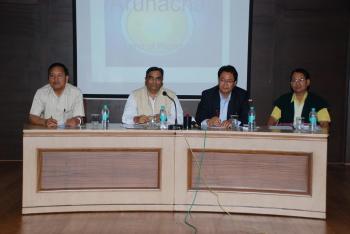Speakers from Arunachal Pradesh at a seminar on “The Land of the Rising Sun: Arunachal” today evening stressed on the urgent need for faster integration of the state into the national mainstream and warned of lurking dangers – from missionaries and anti-national groups internally and from China externally. Panelists at the seminar, organised by the Vivekananda International Foundation, unanimously asked the government as well as the people of India to spread better awareness about Arunachal Pradesh instead of routine reaffirmation of how Arunachal is an integral part of the country. The three panelists were Kiran Rejiju, former Member of Parliament from the BJP who is now with the Congress, Dr Joram Begi, Director of Higher and Technical Education, Itanagar, and his deputy, Dr Tejum Padu.
Rijiju put his finger on the raw spot of the Arunachalese when he lamented that the state comes into news only when China stakes claim on the largest of the eight north-east Indian states, having more than 86,000 sq km area. He put a rhetorical poser: Arunachal Pradesh understands the idea of India, but does India understand the idea of Arunachal Pradesh? He said the Arunachalese were better aware of the Chinese threat today than they were in 1962 when China invaded India. He drew a lusty applause from the audience when he said India does not end with Arunachal; India begins from Arunachal. Rijiju informed that Arunachal Pradesh was poised to be the richest state in the country in terms of per capita income by 2016-17.
The former MP who may well be the most widely travelled Indian – he has travelled to 136 countries – said the situation in Arunachal today was not normal. Even though he belongs to the Congress party that runs both the Central and state governments, he did not mince words when he said the Government of India’s policy does not conform to aspirations of the Arunachalese. He took a dig over India’s Look East policy – launched by Prime Minister P V Narasimha Rao in 1991 – when he said the Government suffered from a neck problem and it could not look East. He said though developmental work on Prime Minister Manmohan Singh’s Rs 24,000 crore package was underway, the pace of the developmental work was far below the satisfactory levels.
Dr Joram Begi gave a detailed presentation on the historical aspects of Arunachal. He said in a way the 1962 aggression of the Chinese was a blessing in disguise, not only for Arunachal but for India too. He said the real development of the state started taking place only after the 1962 war. He said it was only in 1965 that North Eastern Frontier Agency (NEFA), that included Arunachal, was brought under the control of the Ministry of Home Affairs. Prior to that, NEFA was under the control of the Ministry of External Affairs. He said a three-tier Panchayati Raj system was introduced that involved people in governance at the grassroots levels. Dr Begi also recounted how from just two primary schools with 35 students in 1947 and almost zero literacy rate, the state today boasted of more than two thousand educational institutions and had a literacy rate of 54.7 %.
TCA Rangachari, India’s former Ambassador to France and Germany, and a noted China expert, presided over the proceedings, while the VIF top brass like Ajit Doval, C D Sahay, Satish Chandra and Lt Gen (Retd) R K Sawhney formed part of a highly receptive audience. VIF Secretary Mukul Kanitkar introduced the topic, while Sujatha Naik, Secretary of Vivekananda Kendra Institute of Culture, Guwahati, gave detailed introduction of the panelists.








